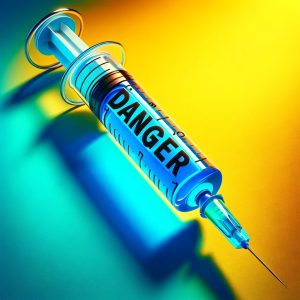Tepezza Hearing Loss Lawsuits. Tepezza also known as teprotumumab-trbw is a prescription infusion medication approved by the U.S. Food and Drug Administration (FDA) for the treatment of Thyroid Eye Disease (TED), also known as Graves’ orbitopathy.

Tepezza Hearing Loss Lawsuits. Call Dr. Shezad Malik at 214-390-3189
Tepezza was approved in 2020 for the treatment of adults with thyroid eye disease, a medical condition where the muscles and fatty tissues behind the eye become congested and swollen due to inflammation, causing the eyes to be pushed forward and bulge outwards (proptosis). The FDA’s approval of Tepezza was the first drug approved for the treatment of thyroid eye disease.
After a short few years of being used, Tepezza is now linked to hearing loss, progressive deafness, tinnitus, and other hearing problems.
What is Thyroid Eye Disease?
Thyroid Eye Disease, also known as Graves’ orbitopathy or Graves’ ophthalmopathy, is an autoimmune condition that affects the muscles and other tissues around the eyes. It is most commonly associated with Graves’ disease, an autoimmune disorder that leads to overactivity of the thyroid gland (hyperthyroidism). However, TED can also occur in individuals with normal thyroid function or hypothyroidism.
The exact cause of TED is not fully understood, but it involves the immune system attacking the tissues around the eyes, leading to inflammation and swelling. This can lead to symptoms such as bulging eyes, double vision, and vision loss.
TED is more common in women than in men and typically occurs in middle age. The course of the disease can vary; some individuals may experience mild symptoms, while others may have severe, vision-threatening complications. Smoking is a known risk factor that can exacerbate the condition.
Treatment for TED aims to manage symptoms and may include lubricating eye drops, selenium supplements, corticosteroids to reduce inflammation, quitting smoking and in some cases, surgery to correct severe eye problems.
Incidence of Thyroid Eye Disease
Tepezza is a monoclonal antibody that works by targeting and inhibiting the insulin-like growth factor 1 receptor (IGF-1R), which plays a role in the progression of TED. By blocking this receptor, Tepezza can help reduce inflammation, proptosis (eye bulging), and other symptoms associated with TED.
Tepezza is administered via intravenous infusion and has been shown to be effective in reducing the signs and symptoms of TED in clinical trials.
Tepezza is manufactured by Horizon Therapeutics plc, a global biopharmaceutical company, based in Dublin, Ireland.
Tepezza Hearing Loss
The use of Tepezza for the treatment of Thyroid Eye Disease (TED) can be associated with several side effects, the most serious of which is hearing loss, which can be temporary or permanent.
Tepezza’s infusion treatment can cause hearing loss by acting as an inhibitor for insulin-like growth factor 1 receptor (IGF-IR). The IGF-IR receptor protects inner ear hair cells from hearing damage caused by noise.
Tepezza Hearing Loss Lawsuits
The Tepezza hearing loss lawsuits alleges that the Tepezza maker Horizon Therapeutics failed to warn about the risk of permanent hearing loss or tinnitus side effects caused by the Tepezza.
Horizon Therapeutics noted a 10% risk of hearing problems discovered during clinical trials, but since then newer studies have found that up to 65% of patients have developed new, worsening or permanent hearing problems.
Tepezza’s approval was accelerated through the FDA new drug investigative process in January 2020, without in-depth research from large clinical trial groups to evaluate all of the potential side effects and their seriousness among different groups.
Since the Tepezza’s release into the marketplace, many patients have reported suffering hearing problems after Tepezza infusions, including ringing of the ears, known as tinnitus, autophony, a sensation that their ears were plugged, or total hearing loss.
As a result of discovering that Horizon Therapeutics knew or should have known about the risk of permanent hearing loss after infusions, patients are now filing Tepezza hearing loss lawsuits, claiming that permanent hearing damage could have been avoided if potential hearing loss warnings had been provided to patients, FDA regulators and the doctors.
Injured? Want to file a Tepezza Hearing Loss Lawsuit? Contact Dr. Shezad Malik Law Firm
If you or a loved one used Tepezza and have suffered serious hearing problems including deafness, contact the attorneys at Dr. Shezad Malik Law Firm to learn more about your legal rights. You can speak with one of our representatives by calling 214-390-3189, or by filling out the case evaluation form on this page.
Our law firm’s principal office is in Dallas and we have offices in Fort Worth, Texas. Dr Shezad Malik Law Firm represents clients in dangerous drug and dangerous medical device lawsuits nationwide.
 Dallas Fort Worth Injury Lawyer Blog
Dallas Fort Worth Injury Lawyer Blog

